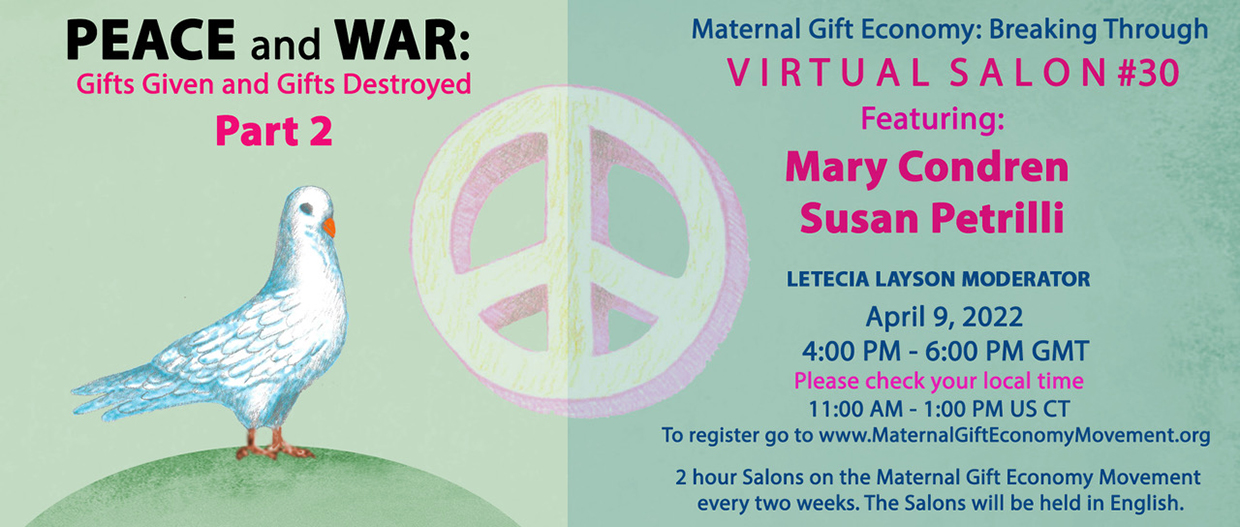Maternal Gift Economy: Breaking Through -
Ongoing Salons
Every two weeks

Maternal Gift Economy Movement - Salon #30 -
April 9, 2022
Featuring Susan Petrilli and Mary Condren
Moderated by Letecia Layson

Mary Condren
Presentation topic: The Garden of Peace, or a World in Permanent War
The Garden of Eden narrative in the Book of Genesis initiates a Great Reversal. Eve’s birth from Adam’s rib begins radical human alienation. The maternal gift economy is destroyed using shame, guilt, sin, and an indebtedness that spreads way beyond its theological roots. This presentation will analyse the trace hauntings of a lost matrixial worldview and the implications for nurturing cultures of peace or cultures of war.
Bio
Mary Condren, Th.D is director of Woman Spirit Ireland and a Research Fellow at the Centre for Gender and Women’s Studies in the School of Histories and Humanities at Trinity College Dublin. Her critical work concerns the role of violence and the discourses of sacrifice in contemporary politics. Her constructive work focusses on recuperating the indigenous female traditions of Old Europe in Ireland.
More information @ The Centre for Gender and Women’s Studies and Academia.edu/MaryCondren
- Download Mary Condren: Eve and the Serpent pdf

Susan Petrilli
Presentation topic: Community, Identity, War
National territories, Nation States, Union of States are the building blocks of human social communities in the world as we know it. As it is organized in the global communication era, the world today is the result of war, it is sanctioned by war. All communities appeal to identity, to the condition of belonging. We belong to a community with its identity – whether ethnic, national, religious, sexual, involving creed, belief, social role, social status. Insofar as differences belong to the same totality, the same community, they are rendered uniform. Identity sacrifices difference. The capitalist world is characterized by an enormous potential for destruction. And destruction is connected to identity, to belonging, to the exportation of freedom and democracy, of values and life-style, to the arrogance of reason, and to the exaltation of technique/technology, commodities, productivity, efficiency, consumerism, the equal exchange market over the people. On one side, all this presupposes investments in “human capital” and, on the other, it justifies “humanitarian wars”. In a world constructed on war, peace is the peace of war, peace is granted by war, and to maintain peace is to maintain the status quo as achieved through war. But true peace is not the peace of a conscience at peace, the peace of war and destruction, but peace for social change, for change in a world that is no less than the effect and at once the cause of war, a world where communication of identity and conflict among identities has reached planetary dimensions. True peace is the peace of a world where identity is open to difference, to difference as otherness, to listening and hospitality of the other.
Susan Petrilli is Full Professor of Philosophy and Theory of Languages, University of Bari Aldo Moro, Italy, where she teaches Philosophy of Language, Semiotics, Semiotics of Law and Intercultural Translation, Semiotics of Translation. She has been affiliated with the University of Adelaide, Australia since 2016, where she is Visiting Research Fellow at the School of Psychology, Faculty of Health Sciences and Medical Sciences. She is honorary member of the Institute of Semiotics and Media Studies, Sichuan University, China. For the International Association for Semiotic Studies she has served as treasurer (2004-2014) and subsequently as vice-President (2014-2020). She is Fellow of the International Communicology Institute, Washington. In 2008 she was installed as the 7th Sebeok Fellow of the Semiotic Society of America. As part of this honour, a volume of her essays was distributed on and for that occasion as a Special Issue of The American Journal of Semiotics (TAJS 24.4). This included an expanded version of her keynote lecture, “Semioethics and Responsibility. Beyond Specialisms, Universalisms and Humanisms”, delivered for the occasion in the framework of the 33rd Annual Meeting of the Semiotic Society of America, 17th October 2008. A main focus of her theoretical work is the relation between signs, values and behaviour. This has led to her conceptualization of “semioethics” and of the “semiotic animal”. She develops translation theory in the framework of global semiotics, linking philosophy of language, semiotics and biosemiotics. Victoria Welby’s “significs” is another special focus in her work. The results of her research are reflected in her numerous publications including monographs and essays. Recent publications in English include: Signifying and Understanding (2009), Sign Crossroads in Global Perspective. Semioethics and Responsibility (2010), Expression and interpretation in Language (2012), The Self as a Sign, the World and the Other (2013), Victoria Welby and the Science of Signs (2015), Sign Studies and Semioethics (2014), The Global World and Its Manifold Faces (2016), Signs, Language and Listening. Semioethic Perspectives (2019). And collective projects edited by her include: Translation and translatability in intersemiotic space, Punctum – International Journal of Semiotics, vol. 06/01 (2020); Brian Medlin, The Level-Headed Revolutionary. Essays, Stories and Poems (2021); Exploring the Translatability of Emotions. Cross-Cultural and Interdisciplinary Encounters and Intersemiotic Approaches to Emotions. Translating across Signs, Bodies and Values (2022).
